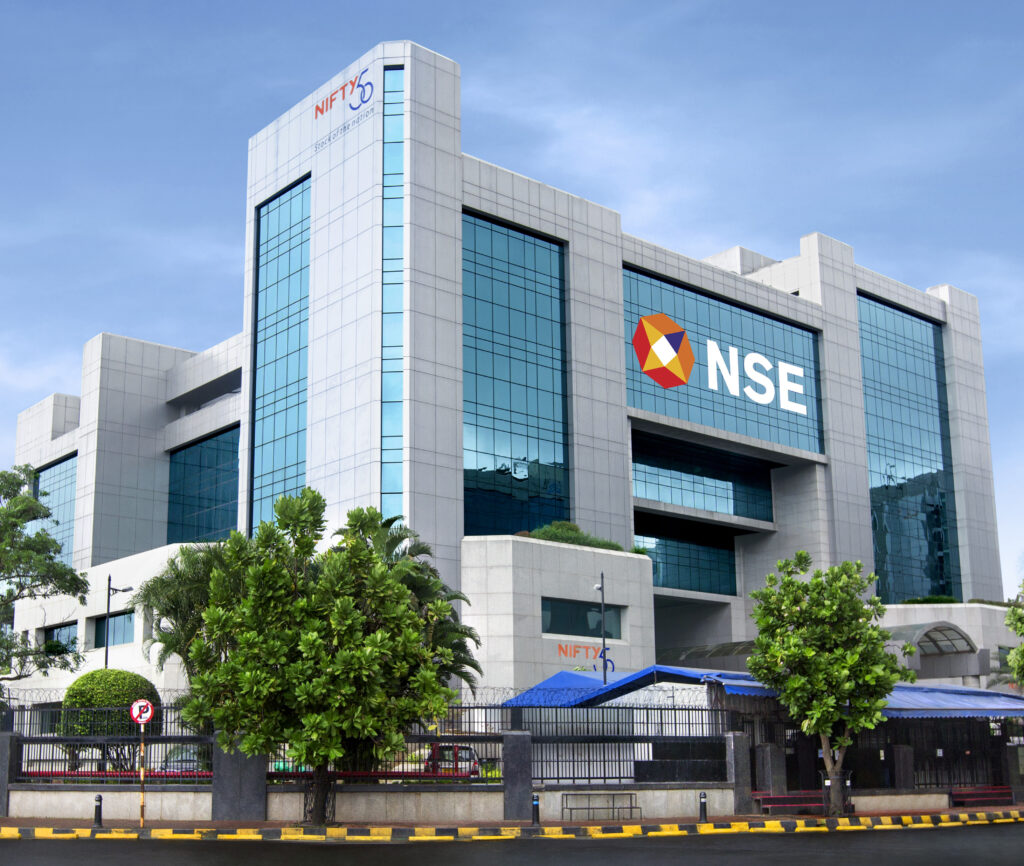What is NSE and BSE

Exploring India’s Premier Stock Exchanges”
The NSE and BSE are the two premier stock exchanges in India.
Here’s some information about each of them:
Both the NSE and BSE play crucial roles in facilitating the trading of securities in India.
These exchanges provide platforms for investors to buy and sell stocks, bonds, derivatives, and other financial instruments.
They have stringent regulatory frameworks and monitoring mechanisms to ensure transparency, fairness, and investor protection in the Indian capital markets.
In the bustling streets of India, amidst the chaos and ambitions, two behemoths stand tall, shaping the dreams and fortunes of countless individuals.
The Bombay Stock Exchange (BSE) and the National Stock Exchange (NSE) stand as the pillars of India’s financial landscape, embodying the dreams and aspirations of its people.
These esteemed stock exchanges weave together a tapestry where emotions surge, optimism soars and destinies are shaped.
Bombay Stock Exchange (BSE):
The Bombay Stock Exchange, also known as BSE, is one of the oldest stock exchanges in Asia.
It is the first stock exchange in India to be recognized under the Securities Contracts Regulation Act, 1956.
It was established in 1875 and is located in Mumbai.
BSE is known for the Sensex index, which represents the performance of the 30 largest and most actively traded stocks listed on the exchange.
Apart from equities, BSE also offers trading in derivatives, debt securities, mutual funds, and currency derivatives.
Initially, it operated as an open outcry system, but it has now transitioned to an electronic trading platform called BOLT (BSE On-Line Trading).
National Stock Exchange (NSE):
The National Stock Exchange of India Ltd. also known as (NSE) was established in 1992 and is located in Mumbai.
It is the largest stock exchange in India in terms of trading volume and market capitalization.
The NSE introduced electronic trading in India, revolutionizing the stock market landscape.
It operates on a fully automated trading system known as the National Exchange for Automated Trading (NEAT).
The NSE offers a wide range of financial products, including equities, derivatives, currencies, and debt securities.
The Nifty 50 index, comprising the top 50 companies listed on the NSE, is widely used as a benchmark for the Indian stock market.
A Tale of Two Giants:
The NSE, often referred to as the “Nifty,” is a beacon of modernity.
With its inception in 1992, it revolutionized the Indian stock market by introducing an automated trading system that swept away the traditional open outcry system.
This change brought efficiency, transparency, and accessibility to investors nationwide.
On the flip side, the Bombay Stock Exchange (BSE), tracing its roots back to 1875, stands as a testament to India’s profound financial journey.
It embraces the weight of tradition and embodies the indomitable spirit of resilience.
Affectionately referred to as the “Sensex,” the BSE has been instrumental in shaping the Indian capital market throughout the years.
BSE: The Beacon of Tradition:
Step into the grandeur of the BSE, and you’re instantly transported to a bygone era.
Here, time seems to stand still, echoing the tales of those who have treaded these hallowed halls.
The BSE’s legacy lies not only in its long-standing existence but in the unwavering trust it has earned from generations of investors.
Its allure lies in its diverse offerings, including equities, derivatives, mutual funds, and more.
The BSE, affectionately known as the “Dalal Street,” serves as the melting pot of ideas, where seasoned investors and astute traders converge.
It provides a fertile ground for wealth creation, with opportunities that captivate both the seasoned player and the wide-eyed newcomer.
NSE: The Vibrant Dynamo:
As the sun rises on the NSE, an electric buzz fills the air.
The NSE is a thriving hub where dreams are nurtured and countless possibilities arise.
It offers a diverse range of financial instruments, such as equities, derivatives, bonds, and ETFs.
The NSE acts as a vibrant focal point, where investors and traders tirelessly endeavor to create wealth.
The NSE’s cutting-edge technology, known as the National Exchange for Automated Trading (NEAT), breathes life into the market.
It enables seamless, lightning-fast transactions, empowering participants to respond swiftly to market dynamics.
This modern marvel levels the playing field, allowing individuals from all walks of life to participate in the exciting world of stocks.
Emotional Rollercoaster:
Investing in the NSE and BSE is not merely a financial pursuit; it is an emotional rollercoaster.
The markets reflect the collective sentiments of millions, swinging between euphoria and despair, hope and fear.
The joy of a successful investment is accompanied by a sense of achievement, while a downturn can bring forth a wave of anxiety and disappointment.
These stock exchanges have witnessed the triumphs and tribulations of countless individuals.
They have seen dreams take flight and fortunes crumble.
The NSE and BSE embody the resilience and determination of the Indian people, who weather storms and celebrate victories together.
FAQ:
Which is better NSE or BSE?
There is no definitive answer to which is better between the National Stock Exchange (NSE) and the Bombay Stock Exchange (BSE). Both exchanges are prominent stock markets in India and have their own strengths and advantages. Factors such as trading volumes, liquidity, listing requirements, and individual preferences of investors and companies may influence their choice. It’s important to consider various factors and conduct thorough research before making investment decisions on either exchange.
What is difference between NSE and BSE?
The National Stock Exchange (NSE) and the Bombay Stock Exchange (BSE) are the two major stock exchanges in India. The NSE was established in 1992, while the BSE is one of the oldest stock exchanges in Asia, dating back to 1875. The NSE is known for its advanced electronic trading system, while the BSE initially relied on an open outcry system but has transitioned to a screen-based trading platform. The NSE’s benchmark index is the Nifty 50, while the BSE’s benchmark index is the Sensex. Both exchanges have their own listing requirements and trading volumes, with NSE generally having higher trading volumes.Top of Form
Can I buy in BSE and sell in NSE?
Yes, you can buy stocks on the Bombay Stock Exchange (BSE) and sell them on the National Stock Exchange (NSE) or vice versa. Both exchanges allow for inter-exchange trading, enabling investors to execute transactions across different stock exchanges. However, it’s important to note that the price of a stock may vary slightly between the two exchanges due to factors like liquidity and demand. It’s advisable to consider the transaction costs, liquidity, and any potential price differences before executing such trades. Consulting with a financial advisor or broker can provide you with more specific guidance based on your individual investment goals and circumstances.
How NSE and BSE works?
The National Stock Exchange (NSE) and the Bombay Stock Exchange (BSE) are electronic stock exchanges in India. They provide a platform for buying and selling securities, including stocks, bonds, and derivatives. Investors place orders through brokers, who connect to the exchanges’ trading systems. These exchanges facilitate order matching and trade execution by bringing buyers and sellers together. The exchanges operate using computerized trading systems that match orders based on price and time priority. The NSE and BSE maintain strict regulations and listing requirements for companies. They also provide real-time market data, indices, and trading tools to investors, enabling efficient and transparent trading activities in the Indian capital markets.
Conclusion:
In the heart of India’s financial landscape, the NSE and BSE stand tall as pillars of opportunity and hope.
These stock exchanges have become much more than platforms for trading securities; they are the epitome of aspirations, emotions, and dreams.
Whether it’s the vibrant dynamo of the NSE, with its cutting-edge technology and boundless possibilities, or the beacon of tradition that is the BSE, steeped in history and trust, both exchanges offer.
